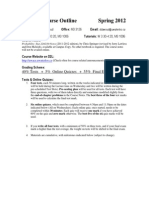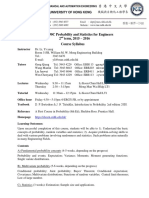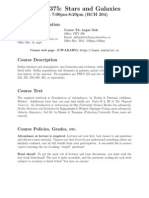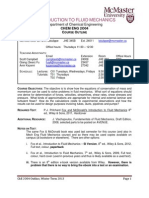NE 242 Syllabus 2013
NE 242 Syllabus 2013
Uploaded by
Nick VardyCopyright:
Available Formats
NE 242 Syllabus 2013
NE 242 Syllabus 2013
Uploaded by
Nick VardyOriginal Description:
Copyright
Available Formats
Share this document
Did you find this document useful?
Is this content inappropriate?
Copyright:
Available Formats
NE 242 Syllabus 2013
NE 242 Syllabus 2013
Uploaded by
Nick VardyCopyright:
Available Formats
NE 242: Electronic Devices
Spring 2013
Course Outline
Course description
Introduction to the physics of semiconductor materials and devices: electronic band structure,
charge carriers, doping, carrier transport, pn-junctions, MOS transistors, optoelectronic devices
(photodetectors, LEDs, solar cells).
Instructor
Prof. Irene Goldthorpe, Department of Electrical and Computer Engineering
Office: QNC 4601
Email: igoldthorpe@uwaterloo.ca
Phone: ext. 31242
Office Hours: 11:30 12:30pm Fridays, or by appointment.
Textbook (required)
Donald Neamen, Semiconductor Physics and Devices, 4
th
Ed, McGraw-Hill (2011)
(3
rd
edition is also fine)
Course website
LEARN, NE 242
Lectures
Room QNC-2502
10:30 11:20am Tue & Thu
9:30 10:20am Fri
11:30am 12:20pm Fri (3 or more of the following dates: May 10, May 24, Jun 7, Jul 5,
Jul 19)
Tutorials
Section 1: 4:30 5:20pm Wed. Room - QNC 1506
Section 2: 4:30 5:20pm Thurs. Room - QNC 1507
Section 3: 4:30 5:20pm Fri. Room - QNC 2501
No tutorials will be held in the first week. Tutorials begin the second week of term.
Labs
Room QNC-2611
Section 1: 1:30 4:20pm Thu (May 9, May 23, Jun 6, Jun 20, Jul 4, Jul 18)
Section 3: 1:30 4:20pm Wed (May 8, May 22, Jun 5, Jun 19, Jul 3, Jul 17)
Section 4: 1:30 4:20pm Thu (May 16, May 30, Jun 13, Jun 27, Jul 11, Jul 25)
Section 5: 1:30 4:20pm Tue (May 14, May 28, Jun 11, Jun 25, Jul 9, Jul 23)
Section 6: 1:30 4:20pm Wed (May 15, May 29, Jun 12, Jun 26, Jul 10, Jul 24)
Pre-lab assignments are to be uploaded on LEARN before the start of your lab session. Late
pre-lab assignments will not be accepted.
Lab reports are due 6 days after your lab session (eg. For Tuesday lab sessions, the report is due
by 11:59pm on the following Monday). Late submissions will incur a 10% penalty per day.
If you anticipate missing a lab, contact the lab instructor. If a lab is missed without a valid
reason, the mark for that lab will be zero
Teaching Assistants
Nicholas Vardy
Email: ngvardy@uwaterloo.ca
Office: DC 3728
Ahmed Mahoud Mohamed
Email: a5mahmou@uwaterloo.ca
Office: E5 4118
Sibi Sutty
Email: sbssutty@engmail.uwaterloo.ca
Office: E3 3140
Graeme Williams
Email: g3willia@uwaterloo.ca
Office: DC 3718
TA office hour: Thursdays starting May 16
th
, 5:30 6:30pm, QNC 1507
Lab Instructor
Maziar Moradi
Email: m3moradi@uwaterloo.ca
Office: ERC 2014
Course Outline
Description of semiconductor materials [Chapter 1]
Electronic band structure [Chapter 3]
Electrons and holes in equilibrium [Chapter 4]
Carrier transport [Chapter 5]
Excess carriers [Chapter 6]
pn junctions [Chapter 7 & 8]
Metal-oxide-semiconductor field effect transistors (MOSFETs) [Chapter 10]
LEDs, photodetectors, solar cells [Chapter 14]
Time permitting: MOS capacitor capacitance-voltage measurements [Chapter 10.2]
Time permitting: Metal-semiconductor junctions (Ohmic/Schottky contacts) [Chapter 9]
Evaluation
Labs (6) 20%
Assignments (2) 6%
Midterm 24% (Mon June 17, 8:30 9:50am)
Final Exam 50%
Problem sets will be assigned approximately every week, are not handed in or graded,
and will be discussed in the tutorial. Solutions will be posted on the website.
There will be two assignments which ARE to be handed in. One will be assigned
between the start of the course and the midterm, and the other will be assigned
sometime between the midterm and the end of the course.
Midterm and exam will be closed book. Equation sheets will be provided.
If the midterm is missed due to last minute circumstances and appropriate
documentation is provided (eg. verification of Illness form), the weight of the final will
be increased accordingly. If a student misses the midterm without a valid reason, their
midterm earns a score of zero.
Required Statements
Academic Integrity: In order to maintain a culture of academic integrity, members of the
University of Waterloo community are expected to promote honesty, trust, fairness, respect
and responsibility. [Check www.uwaterloo.ca/academicintegrity/ for more information.]
Grievance: A student who believes that a decision affecting some aspect of his/her university
life has been unfair or unreasonable may have grounds for initiating a grievance. Read Policy
70, Student Petitions and Grievances, Section 4,
www.adm.uwaterloo.ca/infosec/Policies/policy70.htm. When in doubt please be certain to
contact the departments administrative assistant who will provide further assistance.
Discipline: A student is expected to know what constitutes academic integrity [check
www.uwaterloo.ca/academicintegrity/] to avoid committing an academic offence, and to take
responsibility for his/her actions. A student who is unsure whether an action constitutes an
offence, or who needs help in learning how to avoid offences (e.g., plagiarism, cheating) or
about rules for group work/collaboration should seek guidance from the course instructor,
academic advisor, or the undergraduate Associate Dean. For information on categories of
offences and types of penalties, students should refer to Policy 71, Student Discipline,
www.adm.uwaterloo.ca/infosec/Policies/policy71.htm. For typical penalties check Guidelines
for the Assessment of Penalties,
www.adm.uwaterloo.ca/infosec/guidelines/penaltyguidelines.htm.
Appeals: A decision made or penalty imposed under Policy 70 (Student Petitions and
Grievances) (other than a petition) or Policy 71 (Student Discipline) may be appealed if there
is a ground. A student who believes he/she has a ground for an appeal should refer to Policy
72 (Student Appeals) www.adm.uwaterloo.ca/infosec/Policies/policy72.htm.
Note for Students with Disabilities: The Office for Persons with Disabilities (OPD),
located in Needles Hall, Room 1132, collaborates with all academic departments to arrange
appropriate accommodations for students with disabilities without compromising the academic
integrity of the curriculum. If you require academic accommodations to lessen the impact of
your disability, please register with the OPD at the beginning of each academic term.
You might also like
- Arlete's Notes For Step 3 - USMLE ForumsDocument14 pagesArlete's Notes For Step 3 - USMLE ForumsWyz Class100% (3)
- MAT1330D W19 OutlineDocument3 pagesMAT1330D W19 OutlineClerona FelicienNo ratings yet
- CHE 330 SyllabusDocument5 pagesCHE 330 Syllabusbuggs1152No ratings yet
- CHM 2045 Syllabus F16 MWDocument4 pagesCHM 2045 Syllabus F16 MWCinzNo ratings yet
- Transactional Analysis QuestionnaireDocument7 pagesTransactional Analysis QuestionnaireAbhishek Bajpai100% (1)
- Divisional Contact: Dr. Reza Razeghifard, (954) 262-8333 Razeghif@nova - EduDocument6 pagesDivisional Contact: Dr. Reza Razeghifard, (954) 262-8333 Razeghif@nova - EduLucas RyanNo ratings yet
- Stat 230 Course OutlineDocument3 pagesStat 230 Course OutlineTimothy Hyeunggyu KimNo ratings yet
- University OTAWWA RPP 1 LEMBAR - ELG3175-syl-2015Document2 pagesUniversity OTAWWA RPP 1 LEMBAR - ELG3175-syl-2015Muhamad Andri KurniawanNo ratings yet
- Assignment 2Document2 pagesAssignment 2Andrew LoNo ratings yet
- CSCI 3030 Computing, Ethics, and Society SyllabusDocument5 pagesCSCI 3030 Computing, Ethics, and Society SyllabusJose JohnsonNo ratings yet
- UT Dallas Syllabus For Phys2325.001.11f Taught by Jason Slinker (jds107020)Document7 pagesUT Dallas Syllabus For Phys2325.001.11f Taught by Jason Slinker (jds107020)UT Dallas Provost's Technology GroupNo ratings yet
- Jurnal 3ENU4103 Syllabus - Spring 2017Document5 pagesJurnal 3ENU4103 Syllabus - Spring 2017candra wijayaNo ratings yet
- Syllabus Statics Word Fall203Document4 pagesSyllabus Statics Word Fall203magiccarp.pokemonNo ratings yet
- ECE 3040 Syllabus-Sp2013Document2 pagesECE 3040 Syllabus-Sp2013niplfshNo ratings yet
- EEE 3350 Syllabus - Fall 2012 MalochaDocument3 pagesEEE 3350 Syllabus - Fall 2012 MalochaJerrod RoutNo ratings yet
- SyllabusDocument4 pagesSyllabusBradley ChristmasNo ratings yet
- 320 Syllabus Spring2017 PDFDocument4 pages320 Syllabus Spring2017 PDFAdam ChangNo ratings yet
- PHYS 241 Syllabus Fall 2012Document6 pagesPHYS 241 Syllabus Fall 2012Ali HamidNo ratings yet
- MIT Physical Chemistry SyllabusDocument2 pagesMIT Physical Chemistry SyllabusjoeliniaNo ratings yet
- MECE 3270-Course Outline-2013 Rev01Document6 pagesMECE 3270-Course Outline-2013 Rev01colaarawrNo ratings yet
- CE573 Fall2016 SyllabusDocument3 pagesCE573 Fall2016 Syllabusahmed11 engyemenNo ratings yet
- Syllabus I. Course Information:: ND TH THDocument4 pagesSyllabus I. Course Information:: ND TH THishaliNo ratings yet
- Syllabus For Penn State STAT 440, Spring 2013 Computational StatisticsDocument2 pagesSyllabus For Penn State STAT 440, Spring 2013 Computational StatisticsJustine WilliamsNo ratings yet
- TO Fluid Mechanics: Department of Chemical EngineeringDocument6 pagesTO Fluid Mechanics: Department of Chemical EngineeringMas KumambangNo ratings yet
- 2013 Syllabus Ce 508Document7 pages2013 Syllabus Ce 508Manu VegaNo ratings yet
- Me3281 2013Document3 pagesMe3281 2013joe_grnNo ratings yet
- Physics202 1 2015 2016 SyllabusDocument2 pagesPhysics202 1 2015 2016 SyllabusMįýųķį ČhąñğNo ratings yet
- Syllabus MAE91 Summer 2016Document4 pagesSyllabus MAE91 Summer 2016CherieCheungNo ratings yet
- SYDE 285-W12 Syllabus-ShortDocument3 pagesSYDE 285-W12 Syllabus-Shortdc48fbqjypNo ratings yet
- Course Outline of PHY 101Document5 pagesCourse Outline of PHY 101DIP GHOSHNo ratings yet
- 2022S Mgec11Document5 pages2022S Mgec11Mick MendozaNo ratings yet
- UT Dallas Syllabus For Ce3310.001.09f Taught by Jeong-Bong Lee (Jblee)Document5 pagesUT Dallas Syllabus For Ce3310.001.09f Taught by Jeong-Bong Lee (Jblee)UT Dallas Provost's Technology GroupNo ratings yet
- Ee102 PDFDocument7 pagesEe102 PDFhalfi5No ratings yet
- UT Dallas Syllabus For Mech2310.001.11s Taught by P L Thamban (Stephan)Document7 pagesUT Dallas Syllabus For Mech2310.001.11s Taught by P L Thamban (Stephan)UT Dallas Provost's Technology GroupNo ratings yet
- Zhu CE 329 Syllabus SP 2014Document4 pagesZhu CE 329 Syllabus SP 2014sDq746Gwyn6nNo ratings yet
- Cellular Biology Syllabus Fall Semester 2016Document3 pagesCellular Biology Syllabus Fall Semester 2016Aaron SamuelNo ratings yet
- EE 302 SyllabusDocument5 pagesEE 302 SyllabusKieran HannonNo ratings yet
- Department of Physics and Astronomy: Contact InformationDocument4 pagesDepartment of Physics and Astronomy: Contact InformationAnonymous VQrc08SlNo ratings yet
- Phys1111 Fall2018 SyllabusDocument5 pagesPhys1111 Fall2018 SyllabusHazem EmadNo ratings yet
- Original Syllabus of MATH241Document5 pagesOriginal Syllabus of MATH241salumonaNo ratings yet
- Ap Syllabus 2014-2015Document3 pagesAp Syllabus 2014-2015api-261279162No ratings yet
- ELEE3240U Course Outlines 2015Document6 pagesELEE3240U Course Outlines 2015ahmad.a.touseefNo ratings yet
- UT Dallas Syllabus For Ee4301.501.11f Taught by Ricardo Saad (Rsaad)Document5 pagesUT Dallas Syllabus For Ee4301.501.11f Taught by Ricardo Saad (Rsaad)UT Dallas Provost's Technology GroupNo ratings yet
- Instructor: Office: Office Hours:: Smpuwal2@oakland - EduDocument6 pagesInstructor: Office: Office Hours:: Smpuwal2@oakland - EduMarkus SenojNo ratings yet
- Course Outline MECH 262-001Document6 pagesCourse Outline MECH 262-001Samuël VaillancourtNo ratings yet
- Ee 179/ece 172: Linear Control System: Engr. Edilberto C. Vergara, JRDocument3 pagesEe 179/ece 172: Linear Control System: Engr. Edilberto C. Vergara, JRJohn Paul GarciaNo ratings yet
- Syllabus Dual Enrollment-Ap Physics 2013-2014Document2 pagesSyllabus Dual Enrollment-Ap Physics 2013-2014api-235445484No ratings yet
- Dynamics Syllabus-Summer B 2015Document4 pagesDynamics Syllabus-Summer B 2015angelNo ratings yet
- UT Dallas Syllabus For Math2418.001.08s Taught by Paul Stanford (phs031000)Document8 pagesUT Dallas Syllabus For Math2418.001.08s Taught by Paul Stanford (phs031000)UT Dallas Provost's Technology GroupNo ratings yet
- Syllabus For ME6703 - RizzoDocument3 pagesSyllabus For ME6703 - RizzoAlvinNo ratings yet
- Phys NotesDocument3 pagesPhys NotesAnonymous t2vYLDNo ratings yet
- Proposed Course Outline: ERTH 445 Exploration Seismology Fall 2011Document5 pagesProposed Course Outline: ERTH 445 Exploration Seismology Fall 2011Kewei ChenNo ratings yet
- Phys101 Spring 2012-13 OutlineDocument2 pagesPhys101 Spring 2012-13 OutlineemuphychemNo ratings yet
- Fneranga@andrew Cmu EduDocument5 pagesFneranga@andrew Cmu EduRichard GomezNo ratings yet
- UMass Amherst syllabus-MAE493Document7 pagesUMass Amherst syllabus-MAE493Jaysonn KayNo ratings yet
- Syllabus Econ 1Document4 pagesSyllabus Econ 1da.hvedNo ratings yet
- Physics 1 Syllabus 2015-16Document8 pagesPhysics 1 Syllabus 2015-16api-301989803No ratings yet
- CON HE Lements of Conomics Nalysis InterDocument4 pagesCON HE Lements of Conomics Nalysis InterMário CerqueiraNo ratings yet
- ME 330 HeltzelDocument5 pagesME 330 Heltzelellie<3No ratings yet
- Sol-Gel Science The Physics and Chemistry of Sol-Gel Processing - Brinker 1990Document462 pagesSol-Gel Science The Physics and Chemistry of Sol-Gel Processing - Brinker 1990Roberto Wagner Dos SantosNo ratings yet
- AwesomeDocument1 pageAwesomeNick VardyNo ratings yet
- Useless 2Document1 pageUseless 2Nick VardyNo ratings yet
- UselessDocument1 pageUselessNick VardyNo ratings yet
- Asmiro 2022ArticleBananavaluechainsustainabilityDocument11 pagesAsmiro 2022ArticleBananavaluechainsustainabilityKev NionNo ratings yet
- Half Termly Overview 1/9/20 To 16/10/20 Year 11 English Language & English LiteratureDocument17 pagesHalf Termly Overview 1/9/20 To 16/10/20 Year 11 English Language & English LiteraturesaadNo ratings yet
- Shading and Texturing 0.1Document17 pagesShading and Texturing 0.1CUTE ERRORNo ratings yet
- LAN Party Skate Park by Shane Jesse ChristmassDocument91 pagesLAN Party Skate Park by Shane Jesse ChristmassPatrick TrottiNo ratings yet
- Tieng Anh Chuyen Nganh 2 Esp121 EditDocument61 pagesTieng Anh Chuyen Nganh 2 Esp121 EditpmtthaodaoNo ratings yet
- Research CaballesDocument18 pagesResearch CaballescaballesandreanicoleaNo ratings yet
- Gravimetri 2014Document35 pagesGravimetri 2014Ulfa Wulandari50% (2)
- 10 Kinds of Disinfectants of PigsDocument3 pages10 Kinds of Disinfectants of PigsAustin DrykeNo ratings yet
- Pre Post Self Assessment Spanish 3Document2 pagesPre Post Self Assessment Spanish 3api-528355513No ratings yet
- ENG Lish FA - 3 A CTI VIT Y-2Document20 pagesENG Lish FA - 3 A CTI VIT Y-2Maitri ShahNo ratings yet
- Blu Ray DiscDocument12 pagesBlu Ray Discpavan505No ratings yet
- 07 Carta de Renuncia - en Ingles Insatisfacion Laboral WordDocument1 page07 Carta de Renuncia - en Ingles Insatisfacion Laboral WordMarinaCabanillasLuyoNo ratings yet
- Alagen, The Winged Folk - The HomebreweryDocument1 pageAlagen, The Winged Folk - The HomebreweryAbner TapiaNo ratings yet
- PLA PBS Pbat: According To Established Standards & Certification SchemesDocument1 pagePLA PBS Pbat: According To Established Standards & Certification SchemesPonglert ChanthornNo ratings yet
- Basic Logic GatesDocument14 pagesBasic Logic GatesMarryShailaine CletNo ratings yet
- Memo Regarding Purchase of Helicopter and Airplane For Riverside County Sheriff's DepartmentDocument8 pagesMemo Regarding Purchase of Helicopter and Airplane For Riverside County Sheriff's DepartmentThe Press-Enterprise / pressenterprise.comNo ratings yet
- Millets As Potential Nutri Cereals - A Review of Nutrient Composition, Phytochemical Profile and Techno FunctionalityDocument16 pagesMillets As Potential Nutri Cereals - A Review of Nutrient Composition, Phytochemical Profile and Techno FunctionalityShams IrfanNo ratings yet
- Staffing A Call CenterDocument3 pagesStaffing A Call CenterDanny Stephan0% (1)
- S.M.A.R.T. Goals: Overview, Writing Tips, and ResourcesDocument2 pagesS.M.A.R.T. Goals: Overview, Writing Tips, and ResourcesBazarCasiopeaNo ratings yet
- CV OMkarDocument2 pagesCV OMkaroattimaradNo ratings yet
- 1g Past Exam Q and AnswerDocument4 pages1g Past Exam Q and AnswerArshad KhanNo ratings yet
- Lenovo LXM WL19CHDocument52 pagesLenovo LXM WL19CHMahmoud Digital-DigitalNo ratings yet
- 13S4P-ICR ICR18650 Lithium-Ion 48VDocument8 pages13S4P-ICR ICR18650 Lithium-Ion 48Vjoe ZNo ratings yet
- VFD Troubleshooting ATV 212Document15 pagesVFD Troubleshooting ATV 212Muhammad azeemNo ratings yet
- CPX3011N ManualDocument100 pagesCPX3011N ManualLuis Emilio RosarioNo ratings yet
- Iptec Midpoint Evaluation - Completed by Michelle 12 15 19Document1 pageIptec Midpoint Evaluation - Completed by Michelle 12 15 19api-508122123No ratings yet
- GrimaldiDocument130 pagesGrimaldiSuman Sanketh HegdeNo ratings yet
- Recruitment and SelectionDocument23 pagesRecruitment and SelectionKevin surya manggalaNo ratings yet





























































































